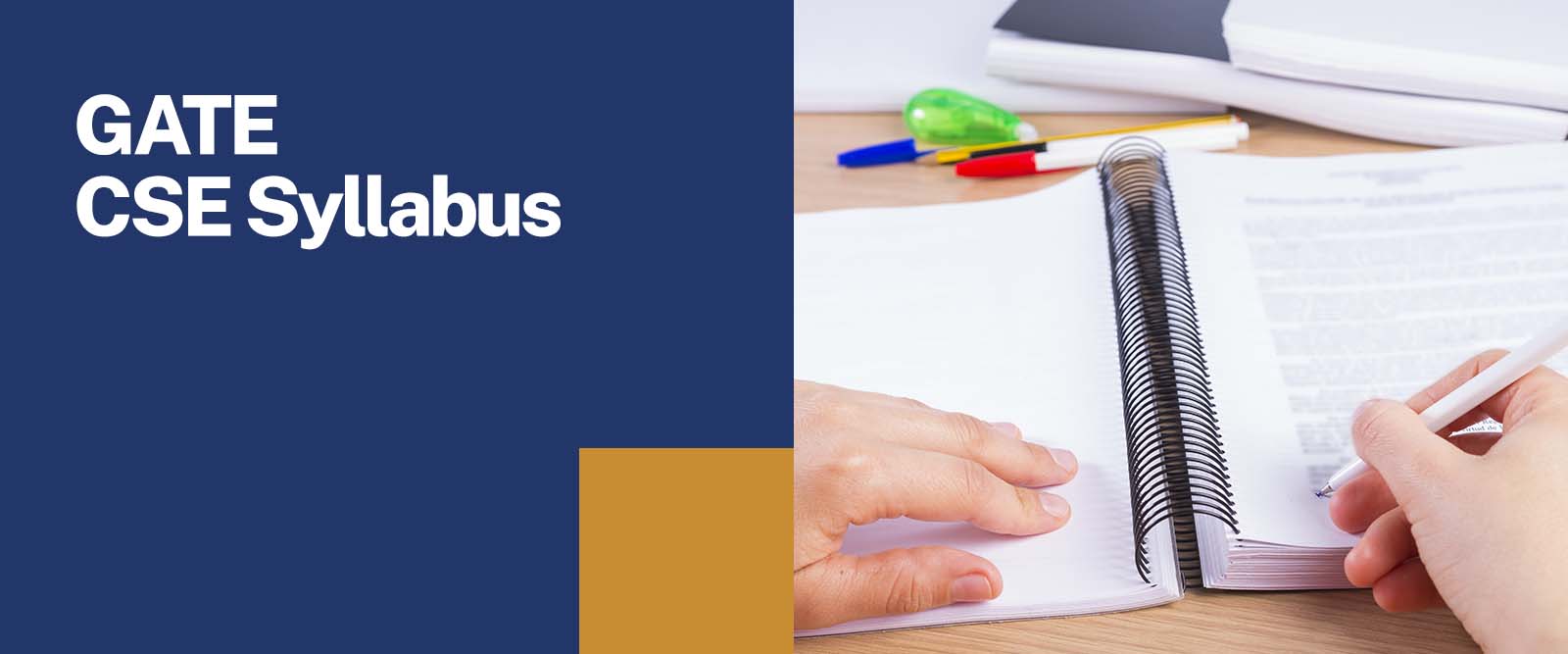5800 students unlocked their dream jobs with UG/PG programs in top colleges. Apply Now!
The Indian Institutes of Technology have broadcasted the GATE syllabus for CSE (Computer Science and Engineering). The GATE Computer Science syllabus will outline all the subjects students need to know to prepare for the exam. Any aspirant planning to take the exam in 2023 should analyse the GATE syllabus CSE and start preparing accordingly.
The CSE syllabus GATE is decided based on the undergraduate engineering course. The syllabus for CSE GATE and Information Technology exam paper syllabus consists of a range of questions related to aptitude, and the subjects (CS and IT) are further divided into various sections
- Digital Logic
- Engineering Mathematics
- Computer Organisation & Architecture
- Algorithms
- Programming & Data Structures
- Compiler Design
- Theory of Computation
- Databases
- Computer Networks
- Operating System
If you wish to know all the details related to the GATE subjects for CSE, you have come to the right place. We have compiled the information regarding the GATE exam computer science syllabus.
GATE Exam Syllabus for CSE
The official list of the GATE subjects for CSE 2023 is yet to be announced by the authority that will conduct the exam, but it will be somewhat similar to the last year’s syllabus.
Here is the syllabus of GATE CSE:
Section I: Engineering Mathematics
Calculus
- Minima and maxima
- Limits, differentiability, and continuity
- Integration
- Mean value theorem
Discrete Mathematics
- Combinatorics: counting,recurrence relations, generating functions
- Graphs: matching, connectivity, colouring
- Groups
- First-order and propositional logic
- Sets, functions, relations, lattices, and partial orders
Linear Algebra
- Eigenvalues and eigenvectors
- Determinants
- Matrices
- The system of linear equations
- LU decomposition
Statistics and Probability
- Mean, mode, standard deviation, and median
- Random variables
- Uniform, exponential, normal, binomial, and Poisson distributions
- Bayes theorem and Conditional probability
Section II: Digital Logic
- Computer arithmetic (floating and fixed point) and Number representations
- Boolean algebra
- Minimisation
- Sequential and Combinational circuits
Section III: Computer Architecture and Organisation
- Machine instructions and Addressing modes
- ALU, control unit, and data path
- Instruction pipelining
- I/O interface ( DMA and interrupt mode)
- Memory hierarchy: main memory, cache, and secondary storage
Section IV: Data Structures and Programming
- Stacks, arrays, linked lists, queues, trees, binary search trees, binary heaps, graphs
- Programming in C
- Recursion
Section V: Algorithms
- Space complexity & Asymptotic worst-case time
- Searching, hashing, sorting
- Algorithm design techniques - divide & conquer, dynamic programming and greedy
- Graph search, shortest paths, and minimum spanning trees
Section VI: Theory of Computation
- Undecidability and turing machines
- Context-free and Regular languages, pumping lemma
- Finite automata and regular expressions
- Push-down automata and context-free grammar
Section VII: Compiler Design
- Local optimisation
- Runtime environments
- Data flow analyses: liveness analysis, constant propagation, common subexpression elimination
- Syntax-directed translation, Parsing, Lexical analysis
- Intermediate code generation.
Section VIII: Operating System
- File systems
- Deadlock
- Processes, system calls, threads, concurrency, synchronisation, and inter‐process communication
- Virtual memory and Memory management
- I/O and CPU scheduling
Section IX: Databases
- Integrity constraints and normal forms
- ER model
- File organisation, indexing (e.g., B and B+ trees)
- Relational model: tuple calculus, relational algebra, SQL
- Concurrency and transactions control
Section X: Computer Networks
- Data link layer: error detection, framing, Ethernet bridging, Medium Access Control
- Concept of layering: TCP/IP and OSI Protocol Stacks
- Transport layer: congestion control and flow control, TCP, UDP,sockets
- Basics of the circuit, packet, virtual circuit switching
- Routing protocols: flooding, shortest path, link state routing, and distance vector
- Application layer protocols: SMTP, DNS, HTTP, Email, FTP
- IP addressing and Fragmentation,CIDR notation, IPv4, Network Address Translation (NAT), Basics of the IP support protocols (DHCP, ARP, ICMP)
Now that you are aware of the GATE exam computer science syllabus let us understand the GATE CSE subject-wise weightage.
GATE Exam CSE Highlights
Here are the highlights of the GATE CSE Exam:
|
Particulars of the Exam |
Details of the Exam |
|
Duration of the exam |
3 hours |
|
Mode of the GATE CSE examination |
CBT(Computer-based test) |
|
Type of Questions |
Numerical Answer Type (NAT) and Objective type |
|
Total number of questions |
65(Sixty Five) |
|
Total marks allotted |
100 |
|
Sections in the exam |
Mathematics Aptitude Engineering Subject-specific questions |
|
GATE CSE syllabus with weightage |
1 mark MCQs(Every wrong answer - 1/3 mark will be deducted) 2 mark MCQs –(Every wrong answer - 2/3 mark will be deducted) No marks will be awarded for any of the unattempted questions There is no negative marking for NAT(Numerical Answer Type) questions |
|
Sectional-wise time-limit |
No |
There are some BTech exam tips that you must keep in mind to prepare for exam and ace it - ensure that you give multiple mock tests, understand the level of preparation you need to pass the exam, and choose the right books that cover the GATE exam syllabus for CSE.
Conclusion
Before preparing for the CSE exam, you first need to ask yourself - why choose BTech?
Once you have the answer to why a BTech degree is helpful for your career, you can start preparing for the GATE exam. A BTech degree is surely one of the most popular degrees in India and the world.
After BTech in Computer Science, there is a whole world waiting for you. While you have chosen the degree, choosing the right higher education provider is essential to ensure that you have the right industry-focused curriculum and placement support.
Sunstone is what you are looking for if you want to enhance your holistic growth and get skills that align with your chosen field of study. You will get a great industry-oriented curriculum, the opportunity to work on your personality development and soft skills, and technical skills with premium internships, projects and holistic development courses.
HELP
Take the first step towards your dream job.
ABOUT THE AUTHOR


